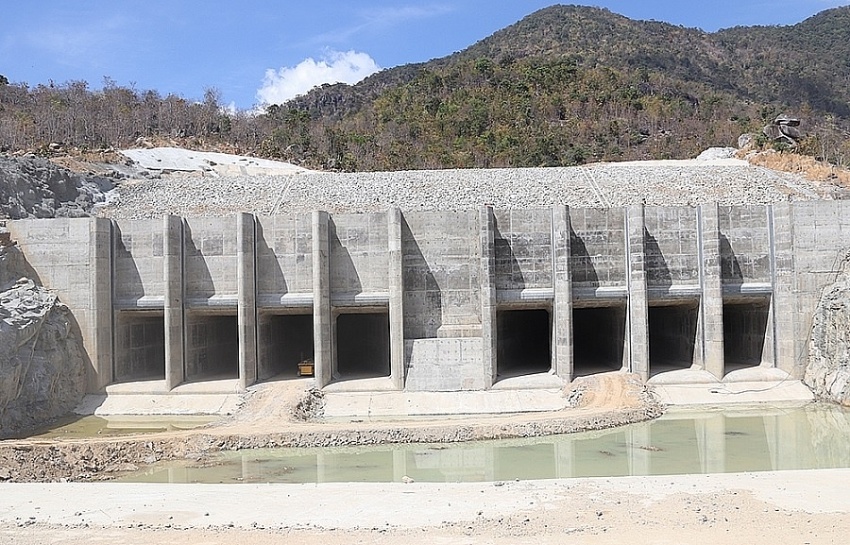Assurances made from EU to support Vietnam’s renewables
Myriam Ferran, deputy director-general at the European Commission Directorate General for International Partnerships, last week paid a first visit to Vietnam to work with government leaders and EU firms to discuss ways to support the country in energy transition, with a rise in renewable energy.
 |
| Assurances made from EU to support Vietnam’s renewables, photo: nangluongsachvietnam.vn |
She visited the 1.2GW Bac Ai pumped storage hydropower facility under construction in the south-central province of Ninh Thuan.
The project, expected to become operational in 2028, includes two phases developed by Vietnam Electricity (EVN) with an estimated investment of $909.7 million. Construction commenced in 2020.
“The Bac Ai project is just among many energy projects that will be financed by the EU in the coming time,” Ferran said. “In ASEAN, Vietnam is an important partner of the EU, both in terms of trade, investment, and energy.”
The European Investment Bank (EIB) has committed €200 million ($217.1 million) in loans in support of the Bac Ai facility, which is included in Vietnam’s Power Development Plan VIII (PDP8). The requirement for electricity storage and fast reserve capacity that this project aims to provide will reinforce the integration of renewable energy, such as wind and photovoltaics, into the grid.
The total loan amount for Bac Ai is €600 million ($651.3 million), including contributions from the EIB, the French Development Agency (AFD), Germany’s KfW Development Bank, and the Japan International Cooperation Agency.
The EU has been implementing its Global Gateway strategy, aimed at supporting clean investment and helping its partner countries meet sustainable development goals and the objectives of the Paris Agreement. The strategy is also focused on facilitating investments in such sectors as green transition, climate change, digital transition, sustainable transformation, and human capital development.
At the EU-ASEAN Commemorative Summit in 2022, the EU committed €10 billion ($10.85 billion) as part of Global Gateway for ASEAN.
In a recent interview in Hanoi, EIB vice president Kris Peeters told VIR that it would like to provide more green loans for environmental-friendly projects in various sectors in Vietnam, from transport, water treatment, and smart urban development to renewable energy and infrastructure. The EIB and Vietnam’s Ministry of Finance agreed on a framework loan of €500 million ($543 million) for Vietnam to materialise its goals under the country’s Just Energy Transition Partnership (JETP).
“For the EIB, Vietnam is an important market where there is a huge need for infrastructure investment. Vietnam is now suffering from a lack of energy as the country’s economy is growing very fast, with a big rise in population,” Peeters said.
Also at the end of 2022, the EIB and EVN signed an MoU on cooperation to enable the direct financing of power ventures in Vietnam and strengthen partnerships in electricity generation, storage, transmission, distribution and sales, and also covers the energy transition towards decarbonisation.
The EIB is also providing technical assistance and finance for Vietnam’s metro line 2 in Ho Chi Minh City and the second phase of metro line 3 in Hanoi.
The EU’s support for Vietnam’s JETP amounts to €876.5 million ($951.6 million), of which €176.5 million ($191.6 million) are in grants. The EU is the largest donor in grants for Vietnam’s JETP. The bloc is already providing assistance to energy transition under a €142 million ($154.2 million) grant agreement, which supports the development of renewable energy, energy efficiency and Vietnam’s energy information system.
The EU also recently signed an agreement with the AFD allocating €16.6 million ($18 million) in grants towards an energy transition facility, which supports EVN on early-stage project development of relevant investments and will accompany JETP implementation with technical assistance. This EU contribution is expected to leverage an additional €1 billion ($1.08 billion) in loans.
According to the PDP8, Vietnam needs about $134.7 billion from domestic and international sources towards 2030, of which $119.8 billion is for power generation sources and $15 billion is for power transmission grid expansion and improvement. This would come from both domestic and international public and private sources.
Last year, Vietnam announced its resource mobilisation plan for its JETP, which has since been fuelled by the international community pledging to accompany the country in its journey.
The International Partnership Group – including the EU, UK, US, Canada, Japan, and more – committed to mobilise significant financing to support Vietnam towards this goal with at least €15.5 billion ($16.8 billion) in public and private finance in the next 3-5 years.
What the stars mean:
★ Poor ★ ★ Promising ★★★ Good ★★★★ Very good ★★★★★ Exceptional
Related Contents
Latest News
More News
- Bac Ai Pumped Storage Hydropower Plant to enter peak construction phase (January 27, 2026 | 08:00)
- ASEAN could scale up sustainable aviation fuel by 2050 (January 24, 2026 | 10:19)
- 64,000 hectares of sea allocated for offshore wind surveys (January 22, 2026 | 20:23)
- EVN secures financing for Quang Trach II LNG power plant (January 17, 2026 | 15:55)
- PC1 teams up with DENZAI on regional wind projects (January 16, 2026 | 21:18)
- Innovation and ESG practices drive green transition in the digital era (January 16, 2026 | 16:51)
- Bac Ai hydropower works stay on track despite holiday period (January 16, 2026 | 16:19)
- Fugro extends MoU with PTSC G&S to support offshore wind growth (January 14, 2026 | 15:59)
- Pacifico Energy starts commercial operations at Sunpro Wind Farm in Mekong Delta (January 12, 2026 | 14:01)
- Honda launches electric two-wheeler, expands charging infrastructure (January 12, 2026 | 14:00)

 Tag:
Tag:


















 Mobile Version
Mobile Version